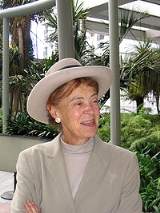
Rosalind Hursthouse
Encyclopedia
Biography
Hursthouse spent her childhood in New ZealandNew Zealand
New Zealand is an island country in the south-western Pacific Ocean comprising two main landmasses and numerous smaller islands. The country is situated some east of Australia across the Tasman Sea, and roughly south of the Pacific island nations of New Caledonia, Fiji, and Tonga...
and taught for many years at the Open University
Open University
The Open University is a distance learning and research university founded by Royal Charter in the United Kingdom...
in England. She was head of the Department of Philosophy at the University of Auckland
University of Auckland
The University of Auckland is a university located in Auckland, New Zealand. It is the largest university in the country and the highest ranked in the 2011 QS World University Rankings, having been ranked worldwide...
from 2002 to 2005. Though she had written a substantial amount previously, Hursthouse entered the international philosophical scene for the first time in 1990-91, with three articles: "Arational Actions", which made an important break with models of human voluntary actions familiar from the work of Donald Davidson
Donald Davidson (philosopher)
Donald Herbert Davidson was an American philosopher born in Springfield, Massachusetts, who served as Slusser Professor of Philosophy at the University of California, Berkeley from 1981 to 2003 after having also held teaching appointments at Stanford University, Rockefeller University, Princeton...
, "Virtue Theory and Abortion", which outlined the structure of a new version of Aristotelian virtue ethics, defended it against possible objections, and applied it to the issue of abortion
Abortion
Abortion is defined as the termination of pregnancy by the removal or expulsion from the uterus of a fetus or embryo prior to viability. An abortion can occur spontaneously, in which case it is usually called a miscarriage, or it can be purposely induced...
, and "After Hume's Justice", which offered an account of social justice in mainly Aristotelian terms and which, though it did not seek to justify democratic institutions, demonstrated that virtue ethics can accommodate certain human or individual rights. Hursthouse is currently a professor of philosophy at the University of Auckland
University of Auckland
The University of Auckland is a university located in Auckland, New Zealand. It is the largest university in the country and the highest ranked in the 2011 QS World University Rankings, having been ranked worldwide...
.
Hursthouse, who was mentored by Elizabeth Anscombe and Philippa Foot
Philippa Foot
Philippa Ruth Foot was a British philosopher, most notable for her works in ethics. She was one of the founders of contemporary virtue ethics...
, is best known as a virtue ethicist
Virtue ethics
Virtue ethics describes the character of a moral agent as a driving force for ethical behavior, rather than rules , consequentialism , or social context .The difference between these four approaches to morality tends to lie more in the way moral dilemmas are...
.
Her work is deeply grounded in the history of philosophy, and especially in Aristotle
Aristotle
Aristotle was a Greek philosopher and polymath, a student of Plato and teacher of Alexander the Great. His writings cover many subjects, including physics, metaphysics, poetry, theater, music, logic, rhetoric, linguistics, politics, government, ethics, biology, and zoology...
's ethics, about which she has written extensively. Hursthouse's article "Virtue Theory and Abortion" argues that whereas most discussions of abortion focus on the issue of who has rights to make decisions regarding the foetus, a decision made within one's rights could still be callous or cowardly, meaning that it would be ethically problematic and potentially devastating for the person making it, whatever the status of the foetus and the reproductive rights of women.
Hursthouse has also emphasized the practical nature of virtue ethics in her books Beginning Lives and Ethics, Humans, and Other Animals. Hursthouse's most substantial contribution to modern virtue ethics is her book On Virtue Ethics, which explores its structure as a distinctive action-guiding theory, the relationship between virtue, the emotions and moral motivation, and the place of the virtues within an overall account of human flourishing. It also expands her formulation of right action in terms of what a virtuous person would characteristically do.
Select publications
- ‘The Central Doctrine of the Mean’ in The Blackwell Guide to Aristotle’s Nicomachean Ethics, ed. Richard Kraut, Blackwell, 2006, pp. 96–115.
- ‘Are Virtues the Proper Starting Point for Ethical Theory?’ in Contemporary Debates in Moral Theory, ed. James Dreier, Blackwell, 2006, pp. 99–112.
- ‘Virtue Ethics’ Stanford Encyclopedia of Philosophy Online, 2003
- 'Virtue Ethics vs Rule-Consequentialism: A Reply to Brad Hooker', Utilitas Vol 14, March 2002 pp 41–53.
- Ethics, Humans and Other Animals, Routledge, 2000 (written as a part of an Open University course).
- On Virtue Ethics, Oxford University Press, 1999. For the author's account of how this book came to be written, go to OUP site
- 'Virtue and Human Nature' in Hume Studies double issue, Nov.1999/Feb.2000.
- 'Intention' in Logic, Cause and Action, ed. Roger Teichmann, Cambridge University Press, 2000.
- 'Virtue Ethics and the Emotions' in Virtue Ethics, ed. Daniel Statman, Edinburgh University Press, 1997.
- 'Hume's Moral and Political Philosophy' in History of Philosophy, Vol. 5, British Philosophy and the Enlightenment, ed. Stuart Brown, Routledge, 1996.
- 'The Virtuous Agent's Reasons: a reply to Bernard Williams' in the Proceedings of the Keeling Colloquium on Aristotle on Moral Realism, ed. Robert Heinaman, UCL Press, 1995.
- 'Normative Virtue Ethics' in How Should One Live? ed. Roger Crisp, OUP, 1995.
- 'Applying Virtue Ethics' in Virtues and Reasons, Festschrift for Philippa Foot, eds. Rosalind Hursthouse, Gavin Lawrence, Warren Quinn, OUP, 1995.
- 'Arational Actions' in The Journal of Philosophy, Vol. LXXXVIII 1991.
- 'Virtue Theory and Abortion' in Philosophy and Public Affairs, Vol. 20, 1990-91.
- 'After Hume's Justice' in Proceedings of the Aristotelian Society, Vol. XCL, 1990/91.

